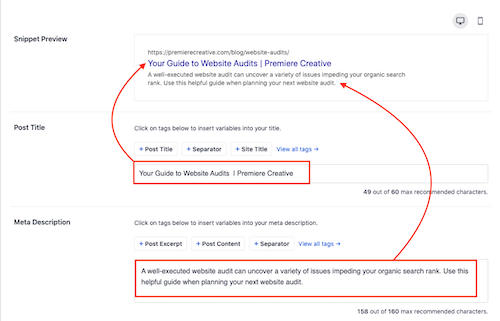Whether due to infrequent maintenance updates or problems with overlapping content, your website can benefit from a comprehensive audit when you notice a drop in monthly conversions. Conducing website audits provide you with insight into how your website operates as a whole. Furthermore, a website audit ensures your digital strategy stays on track, and your digital properties achieve their maximum potential.
Why Should Businesses Execute Website Audits?
Although website audits can seem tedious and time-consuming (especially when you have limited resources), savvy marketers understand these tests are necessary for optimizing your website’s performance. As you ponder whether you should conduct a website audit, ask yourself the following questions:
- Are your conversions increasing or decreasing?
- Is your website accomplishing your (monthly) sales goals?
- Is your website content driving the type of traffic you want?
An effective website audit looks at a multitude of factors and answers key questions to reach goals, which may include:
- Identifying content topics that align with your audience’s interest
- Discovering web pages with overlapping content
- Ensuring growth in revenue
- Generating compelling ideas for future content pieces
- Uncovering new avenues to improve organic search rank
- Increasing targeted organic traffic
- Locating gaps in the content
- Pinpointing any past content marketing pieces with stellar performances
- Removing outdated content
What are the Different Types of Website Audits?
A website audit will provide a cornucopia of valuable information that relates to your marketing plan. To make sure you cover every component on the website, we recommend breaking down your website audits into six distinct categories: technical, SEO, off-page, on-page, content, and usability.
Technical Audits
Technical audits focus on the best practices for website visibility, thereby ensuring a website meets all search engine requirements for crawling and indexing. During this audit, you’ll scour through your website’s code to uncover any errors, missing items, duplicate data, or page speed issues that suppress SEO effort. During the technical audit, you should ask yourself the following:
- Is your SSL certificate properly installed?
- Does the website utilize a content management system?
- Have you changed the default CMS settings, such as the login location page?
- Does your website feature the best practices for security needs?
- Does your website render correctly on every major browser?
- Is your website mobile-friendly in both vertical and landscape formats?
- Have you tested your website using the Google Mobile-Friendly Test tool?
- Is the site utilizing Google Analytics or another analytics tool to report data from each page?
- Are you blocking some important pages via robots.txt or NoIndex meta tags?
- Are there factors affecting your website’s speed? (CSS, Scripts, Images)?
SEO Audits
Search engine algorithms constantly undergo updates and tweaks. Thus, website audits can ensure your SEO efforts align with up-to-date best practices. The three most important elements to examine in an SEO audit are Keywords, Website Layout, and Mobile Optimization.
Keywords focus on commonly searched terms that relate directly to your company and its products. You must use target keyword phrases often enough within your content so that search engines will index your website. You must analyze your keyword focus throughout your site content and consider further opportunities for improvement.
Easy-to-navigate Website Layouts have clear calls to action, so they perform better in search results. As such, you’ll have to mitigate any issues preventing users from exploring your website.
We live in a mobile-centric world, so you cannot overlook Mobile Optimization on your website. A growing percentage of online searches occur on smartphones and tablets, so search engines now penalize websites that are not optimized for mobile devices.
Off-Page Audits
This audit inspects all external SEO elements impacting your site, which helps search engines to determine the level of trust, value, and authorship of your site. During an off-page audit, ask yourself these key questions:
- How many domains link to the website?
- What is the quality of those backlinks and what is the anchor text associated?
- How many backlinks do the landing pages and content have?
- Have you cut out all the bad backlinks? (i.e. – spammy, fishy niches and unnatural backlinks)
- Is your site getting shares on social media? How many?
- Is the site getting mentions and traffic from YouTube and social media platforms?
- Are you sharing content with and reaching out to social influencers frequently?
- Are the backlinks relevant for their language, focus topic, and location?
On-Page Audits
On-page SEO focuses on everything on the website that influences placement in search engines. There are roughly 200 ranking factors that Google considers in its algorithms, such as meta descriptions and title tags.

While no one truly knows exactly how the algorithms work, there are a few things we know about ranking factors. When auditing your on-page needs, consider the following questions:
- Does each web page on the site feature a meta description and title tag targeting desired keywords?
- Is your web copy helpful, substantial, informative, and topic-relevant?
- Does your site have appropriate identifying information such as a phone number and address?
- Are the content pages set up for sharing on social media platforms?
- Do you have a sitemap installed to improve the crawlability and indexing of your pages?
- Are you utilizing simple keyword-enriched URLs?
- Are the major content categories and pages easily reachable through the primary navigational menu?
- Did you include keywords in your image’s alt-text?
- Do you have more than one page talking about the same topic?
- How is your internal linking strategy doing?
Content Audits
Unless you perform regular content audits, there’s a good chance your older posts have suboptimal content. Content audits keep track of your content, including social media posts, events, blogs, and web pages, and provide analysis for how they impact an audience. Additionally, they can provide insights into how to improve underperforming content, so you understand how to invigorate your posts for higher conversion rates.
Usability Audits
A seamless user experience is integral to online success! Missing pages and broken features are a quick turnoff for visitors. Usability looks at the critical tasks of your website against business goals and basic usability standards. To avoid making a bad impression on your website visitors, you’ll want to do a website audit and test for the following:
- 400-error pages (especially on landing pages)
- Bad links/broken links
- Broken features (like a checkout page, images, login pages, or shopping cart)
- Illegible typography
- Website architecture
Exhaustive Website Audits with Premiere Creative
Once you’ve completed your audit, you should start to see some tangible improvement in your search engine optimization and the performance of those pages. If you have a large website that changes often, then an enterprise-grade tag auditing tool is your best bet for success. Need help improving your website for peak performance? Contact us today by dialing (973) 346-8100 to discuss your next website audit.

